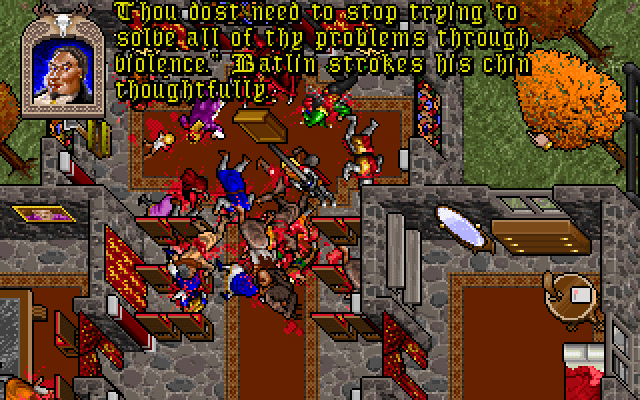Alright, so as I’ve mentioned before, this is a series that has had a lot said about it already and I’m none too inclined to add to that, but I don’t have a better topic for this week, so here we are. I’m going to keep this brief, as there are really only two things I want to talk about here: side quests and combat. I’ll just say for the record that I consider this to be the high point of the series and that I think both parts are excellent, despite the criticisms I’m about to level at them.
The side quests are the best and the worst thing about Ultima 7 (I’m speaking particularly about part 1 here, but this comes up a little in Serpent Isle as well). They’re amazing because they do a lot of good work for the story; they get you involved in the characters in each town, they help you to see how Britannia is beset by a subtle social rot, and they allow you to feel like the Avatar by humbly helping people with their problems and leading by example. Many of the side quests sound trivial relative to ones you would find in modern RPGs, e.g. “I think my husband may be having an affair,” or “Someone vandalized the statue of Lord British at the gate,” but in the context of the game they aren’t trivial at all because you can see how much they matter to the people involved.
So why did I say “the best and the worst”? Because Ultima 7 buries you in side quests (though to be fair, not nearly as badly as Skyrim or Kingdoms of Amalur do), doesn’t manage flags for them well, and does nothing to help you keep track of them. Every town you go into has two or three side quests in addition to whatever might be going on related to the main quest, so upon arriving you immediately have a bunch of different concerns to keep straight. And when you start completing those quests, the NPCs will frequently keep talking like you haven’t because the game doesn’t properly update their dialog to reflect that you have resolved the problem, so if you think you’ve resolved the thief subplot but aren’t sure, it gets really confusing when half the NPCs are talking like the thief is still at large and the other half have nothing to say whatsoever on the subject. Naturally, suspension of disbelief really suffers when the shop owner starts complaining about mysterious thieves two seconds after you tell him who the culprit is.
Combat is a weak point in Ultima 7, not because it can get in the way like the side quest problems do, but because it’s almost entirely superfluous to the game. If you’ve ever read an article about Baldur’s Gate praising the “real-time with pause” system like it’s the Second Coming and wondered what the big deal is, playing Ultima 7 will make it abundantly clear. The combat system literally is just pressing the “C” key and hoping for the best. The game doesn’t give you enough information to tell what is going on, it doesn’t give you enough control to be able to do anything about it, and virtually all the fights are over so quickly as to be non-events. Nothing is so anti-climactic as getting to the end of the game, finally confronting the mysterious mass murders you’ve been chasing from day one, and watching them all fall over in seconds.
I like to imagine that there’s an alternate universe where Origin saw that they had made their best games without combat doing anything for them, and decided to make Ultima 8 a point and click adventure game instead of going the action route. I don’t know if it would have made a better game, but I don’t see how it could have been worse.





